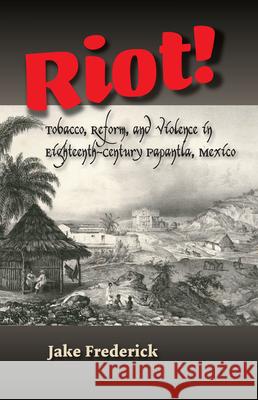Riot!: Tobacco, Reform and Violence in Eighteenth-Century Papantla, Mexico » książka
Riot!: Tobacco, Reform and Violence in Eighteenth-Century Papantla, Mexico
ISBN-13: 9781845198169 / Angielski / Twarda / 2016 / 162 str.
Riot!: Tobacco, Reform and Violence in Eighteenth-Century Papantla, Mexico
ISBN-13: 9781845198169 / Angielski / Twarda / 2016 / 162 str.
(netto: 515,55 VAT: 5%)
Najniższa cena z 30 dni: 521,85
ok. 30 dni roboczych.
Darmowa dostawa!
An exploration of the Totonac native community of Papantla, Veracruz, during the last half of the eighteenth century. Told through the lens of violent revolt, this is the first book-length study devoted to Papantla during the colonial era. The book tells the story of a native community confronting significant disruption of its agricultural tradition, and the violence that change provoked. Papantla's story is told in the form of an investigation into the political, social, and ethnic experience of an agrarian community. The Bourbon monopolisation of tobacco in 1764 disturbed a fragile balance, and pushed long-term native frustrations to the point of violence. Through the stories of four uprisings, Jake Frederick examines the Totonac's increasingly difficult economic environment, their view of justice, and their political tactics. Riot argues that for the native community of Papantla, the nature of colonial rule was, even in the waning decades of the colonial era, a process of negotiation rather than subjugation. The second half of the eighteenth century saw an increase in collective violence across the Spanish American colonies as communities reacted to the strains imposed by the various Bourbon reforms. Riot provides a much needed exploration of what the colony-wide policy reforms of Bourbon Spain meant on the ground in rural communities in New Spain. The narrative of each uprising draws the reader into the crisis as it unfolds, providing an entree into an analysis of the event. The focus on the community provides a new understanding of the demographics of this rural community, including an account of the as yet unexamined black population of Papantla. *** "The author masterfully provides us with new insights into significant themes related to the post-1759 Bourbon Reforms and their impacts on the delicate power balance between colonial rulers and subordinate populations at the local level and beyond in New Spain. This relatively short but well researched, written, and reasoned work will significantly add to scholars' and students' understanding of economic, political, and social tensions in Mexico's late colonial racially and ethnically complex society." --Dr. Patrick Carroll, retired professor of history, Texas A&M University, Corpus Christi (Latin American Studies, History)











